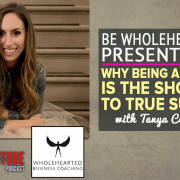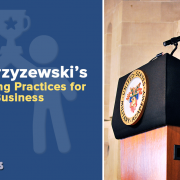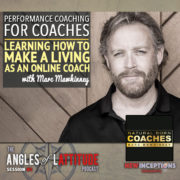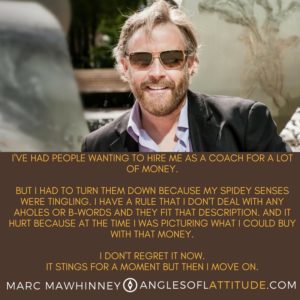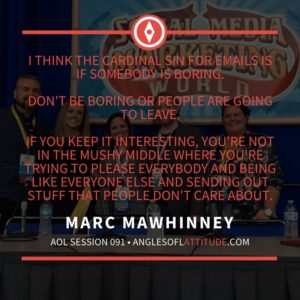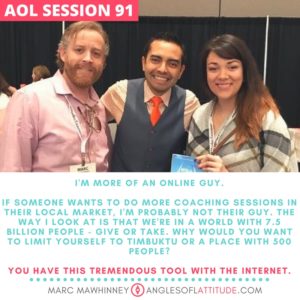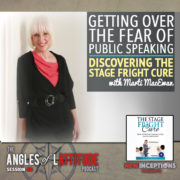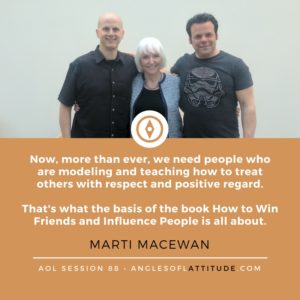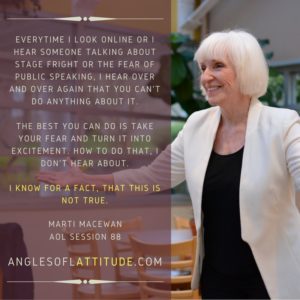As I’ve been going through all of the emotional ups and downs with losing Sadie, there’s been a number of things that have been keeping me optimistic about the future.
For one, there’s a ton of things going well out at Collaborate 317 that I’m glad to hear about. We’re really starting to be recognized by folks in the community. In fact, a nearby town recently contacted us in regards to helping them start their incubator. Oh, and another event that was hosted by HB Bell went pretty well last week. It was called the Community R.U.L.E. Nonprofit Jazz Network Mixer. I got to spend a bit of time at that event after doing last week’s Junto Show with Harrison and Ping. Lots of interesting nonprofits were featured.
Another thing that I’ve been paying close attention to are how the Colts have been dealing with certain events in their organization.
Many of you know that I’m a fan – as I can be found wearing Colts gear pretty regularly. But there’s a reason for that: the team has integrity as a whole. All the way from the top at Jim Irsay (who loves his organization and wants to win) down to the newest members of the team
So when I wear the gear, sure I’m relating as a fan, but I’m also giving myself a reminder in how I need to act.
Recent Examples of Colts’ Integrity
Caring About Others
You might have heard about one of our players getting killed in a drunk driving related accident in early February. The player’s name was Edwin “Pound Cake” Jackson. And he had really only contributed to the team for a year and placed on injury reserve for all of 2017 (meaning he wasn’t able to play even though he was still part of the team).
Even though he hadn’t really been here that long, he was still considered part of the family. Not only did Jim pay for his and his Uber driver’s funerals, but he also set up a scholarship fund in his name.
Not every team would do that.
Sometimes the best Solution isn’t the First Solution
Then there was the recent signing of the Colts’ new head coach.
If you’re familiar at all with the NFL, you know that the Patriots have been doing very well during the last 15+ years. A big part of that success has been their coaching staff – and one of those members was supposedly going to be our new coach after this year’s Super Bowl.
For whatever reason, at the last moment, he decided to go back on his word on becoming our new coach. Needless to say, that angered a bunch of people around the league. For many, it also confirmed that the Patriots have some internal issues with character. As long as someone can do their job when they’re supposed to, they’ll have a place.
Well, we scrambled to find a coach to fit. And let me tell you, our new head coach, Frank Reich, fits the bill of what it means to be a Colt – he has integrity.
Not only was he loyal to his old team throughout the weeks leading up to the Super Bowl by not interviewing with other teams who were looking for their new head coach (he was missing the bus on getting one of these positions), he has fully taken on all responsibilities for working with the team as a part of leadership – not the main guy.
The Colts, especially their new General Manager, Chris Ballard, know what it takes to put a winning team together. And I personally believe that the biggest part of that is knowing if and where people fit into an organization.
Failure in Realizing Talent Leads to Bad Results
I think this was the biggest issue with our last coach and GM combination. They simply had a team where many of the parts didn’t fit quite right. While Grigson would find talent to plug in, Pagano’s job was to help that talent excel.
Apparently they didn’t communicate much on what the vision of the entire team was and that’s where they failed. Specifically, they failed to communicate on the talent of the players and matching that with the three Rs – what’s required, what provides the best return, and what is the greatest reward.
Without having that feedback, the team was set up for failure.
Frankly, it doesn’t matter how good the talent is – no team is going to win if they’re out of place.
How to Put People in the Right Place
In John Maxwell’s book, The 17 Indisputable Laws of Teamwork, there are three laws that we can zero in on when it comes to building a team:
- Niche
- Chain
- Bench
Based on what I’ve seen by our new GM Chris Ballard, I believe that he understands these laws quite well. Let’s take a look at them and how the Colts have or have not utilized these laws appropriately.
Law of the Niche
All players have a place where they add the most value. If you were to look at a typical NFL team, this is super obvious. Lineman wouldn’t be great ball handlers and visa versa. Even going deeper, you could say that many quarterbacks wouldn’t make great running backs.
And even another level – not all players fit all schemes of playing.
For example, there was a player a few years ago who people loved when he was coming out of college. His name was Trent Richardson. Unfortunately, his career didn’t pan out as many people would have expected it to.
Why?
For one, we have to realize that the college game doesn’t always translate directly to the professional level. Not all great college players excel in the NFL. In fact, there are times when lesser known college players will be better in the NFL. In a few subtle ways, it’s a different game.
Trent’s strengths that led him to his success in college didn’t translate directly to the success in the pros.
Also, it didn’t help that he missed a good part of his transitional season due to injury. And when it was time to perform, he wasn’t as fine tuned as he could have been. (It also didn’t help that the leadership of the Browns is known for destroying potentially great players.)
When he got to the Colts, he still looked good on paper. So we were excited to get him. But as a fan base, we realized soon why the Browns allowed him to come.
Besides not having his skills fine tuned for the league, the scheme that he was a part of in college wasn’t the scheme that he had in the pros. Eventually, our leadership let him walk because he wasn’t doing what was expected of him.
Law of the Chain
You’ve heard the saying “You’re only as strong as the weakest point” about teams, I’m sure. And as we’ve seen in the example above with Trent, one could say that he was a bit of a liability to the teams that he was on and to himself.
But is it fair to put that responsibility on his shoulders alone?
Personally, I’d say he got screwed over by being in several systems who didn’t know how to place him correctly. We know he was gifted, so obviously the problem had to be placement related.
The evidence of this is that this past year he bounced back a bit in the CFL. I really think it’s because they knew what they were getting when he got him. Plus, he didn’t have all the weight on his shoulders that he did here. In the NFL you’re expected to be able to perform from day 1. People didn’t really ask why he was not performing to level he should. But had they, they would have realized that he needed more time.
In Maxwell’s book, he says that there are 4 questions to ask about a weak link:
Are they weak because they’re new?
If so, give them some time. (I argue he never had this time to adjust with him missing out on training camp and preseason).
Are they weak because they aren’t growing?
Find out why and help motivate them through the issues. In Trent’s case, he wasn’t growing because he had all the weight on his shoulders from having to perform to support friends and the teams he was a part of. He was being forced to be the answer for everyone’s problems.
Are they weak because they lack people skills?
Help them understand how they’re screwing up. Teach Trent to say no to his “friends” who were using him.
Are they weak because they lack giftedness in this area?
If they’re not meant to ever be in a particular position based on personality or giftedness, don’t push the matter. For Trent, what seemed like a gift issue was actually the other 3 problems.
One last thing to note about this law. Stronger members will tend to pick up the slack of weaker members. In our Colts example, Andrew Luck, (who’s a solid 9 when it comes to leadership qualities) many times had to over exert himself to make up for the lack of offensive effectiveness on the field. I believe that’s one reason, in the long run, the team imploded when he got hurt and had to miss time on the field.
Law of the Bench
When it comes to winning games, the 4th quarter is where it’s at. In 2017, the Colts lost most of their games in the 2nd half. Had the game ended in the first half, the team would have made the playoffs no problem.
But because the team was incapable of playing 4 quarters, they won all of 4 games.
Sure, you could say that it was because coach Chuck Pagano played too conservatively in the second half. But I think that the biggest issue was that when people went down to injury (which we had tons of injuries this year!), there was poor talent to back them up.
Heck, you might even say that in many of our positions we didn’t have the right talent in the first place!
What’s great about having our new leadership, is that they’re righting the boat. They realize that recruiting is just as important as training and dropping the wrong people.
Instead of keeping mismatched players around to fill the roster, I think Chris Ballard realizes that when you spend time with the best people, you don’t have time for the worst.
I mean, he seems to take a Jack Welch strategy to the team. Jack was known for getting rid of the bottom 10% on a regular basis during his time at GE. This made that company so much better during his time there. I think Chris understands the power of dropping people – especially for the right reasons. In the end, he gets stronger and stronger players which gives the team more options.
Action Steps
What a difference a change of leadership can make. To be frank, I’m kind of interested to know what Jim Irsay saw in Coach Pagano and Ryan Grigson when he initially brought them on. One thing that definitely was surprising when they first arrived on the scene was how they removed all the players from the previous team – even those that were actually good.
In hindsight, I’m not sure what to make of that. It doesn’t look like it’s going to pan out the same way with our new leadership – at least not quite yet.
Anyway, when it comes to your organization or small team, I want to make sure you have 4 takeaways from this post:
- Hire for strengths and natural gifts.
- If people aren’t performing to the level you’d expect, ask why. This is key. Maybe you can actually help them improve.
- If you believe they no longer express the gifts that you brought them in for, feel free to remove them. In the long run, it’s for everyone’s best interest.
- Don’t be afraid to look for team members who are better fits for where your organization currently is. Teams are organic and sometimes someone who was a perfect fit last year, might be in a different place this year than last.
Below, let me know what you think about these laws. Do they apply to anything you’ve had experience with? How so?

